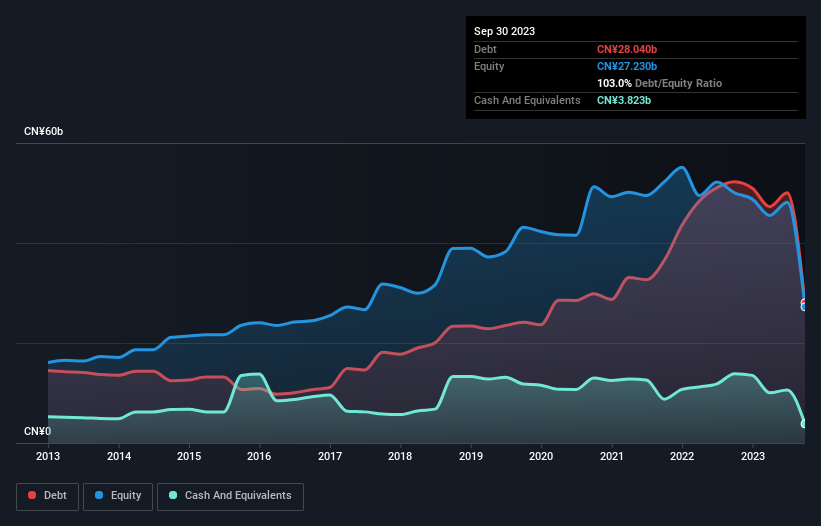- Hong Kong
- /
- Infrastructure
- /
- SEHK:152
Shenzhen International Holdings (HKG:152) Seems To Be Using A Lot Of Debt

Legendary fund manager Li Lu (who Charlie Munger backed) once said, 'The biggest investment risk is not the volatility of prices, but whether you will suffer a permanent loss of capital.' So it seems the smart money knows that debt - which is usually involved in bankruptcies - is a very important factor, when you assess how risky a company is. We can see that Shenzhen International Holdings Limited (HKG:152) does use debt in its business. But the real question is whether this debt is making the company risky.
What Risk Does Debt Bring?
Generally speaking, debt only becomes a real problem when a company can't easily pay it off, either by raising capital or with its own cash flow. Ultimately, if the company can't fulfill its legal obligations to repay debt, shareholders could walk away with nothing. However, a more common (but still painful) scenario is that it has to raise new equity capital at a low price, thus permanently diluting shareholders. By replacing dilution, though, debt can be an extremely good tool for businesses that need capital to invest in growth at high rates of return. The first thing to do when considering how much debt a business uses is to look at its cash and debt together.
View our latest analysis for Shenzhen International Holdings
What Is Shenzhen International Holdings's Debt?
As you can see below, Shenzhen International Holdings had CN¥28.0b of debt at September 2023, down from CN¥52.3b a year prior. However, it also had CN¥3.82b in cash, and so its net debt is CN¥24.2b.

A Look At Shenzhen International Holdings' Liabilities
Zooming in on the latest balance sheet data, we can see that Shenzhen International Holdings had liabilities of CN¥21.0b due within 12 months and liabilities of CN¥19.2b due beyond that. On the other hand, it had cash of CN¥3.82b and CN¥1.98b worth of receivables due within a year. So it has liabilities totalling CN¥34.3b more than its cash and near-term receivables, combined.
This deficit casts a shadow over the CN¥11.7b company, like a colossus towering over mere mortals. So we'd watch its balance sheet closely, without a doubt. After all, Shenzhen International Holdings would likely require a major re-capitalisation if it had to pay its creditors today.
We measure a company's debt load relative to its earnings power by looking at its net debt divided by its earnings before interest, tax, depreciation, and amortization (EBITDA) and by calculating how easily its earnings before interest and tax (EBIT) cover its interest expense (interest cover). The advantage of this approach is that we take into account both the absolute quantum of debt (with net debt to EBITDA) and the actual interest expenses associated with that debt (with its interest cover ratio).
While we wouldn't worry about Shenzhen International Holdings's net debt to EBITDA ratio of 4.6, we think its super-low interest cover of 1.4 times is a sign of high leverage. It seems clear that the cost of borrowing money is negatively impacting returns for shareholders, of late. Even more troubling is the fact that Shenzhen International Holdings actually let its EBIT decrease by 9.1% over the last year. If it keeps going like that paying off its debt will be like running on a treadmill -- a lot of effort for not much advancement. There's no doubt that we learn most about debt from the balance sheet. But it is future earnings, more than anything, that will determine Shenzhen International Holdings's ability to maintain a healthy balance sheet going forward. So if you're focused on the future you can check out this free report showing analyst profit forecasts.
Finally, while the tax-man may adore accounting profits, lenders only accept cold hard cash. So the logical step is to look at the proportion of that EBIT that is matched by actual free cash flow. Over the last three years, Shenzhen International Holdings recorded negative free cash flow, in total. Debt is far more risky for companies with unreliable free cash flow, so shareholders should be hoping that the past expenditure will produce free cash flow in the future.
Our View
To be frank both Shenzhen International Holdings's interest cover and its track record of staying on top of its total liabilities make us rather uncomfortable with its debt levels. And furthermore, its net debt to EBITDA also fails to instill confidence. We should also note that Infrastructure industry companies like Shenzhen International Holdings commonly do use debt without problems. Taking into account all the aforementioned factors, it looks like Shenzhen International Holdings has too much debt. That sort of riskiness is ok for some, but it certainly doesn't float our boat. When analysing debt levels, the balance sheet is the obvious place to start. However, not all investment risk resides within the balance sheet - far from it. For example, we've discovered 4 warning signs for Shenzhen International Holdings (1 can't be ignored!) that you should be aware of before investing here.
If you're interested in investing in businesses that can grow profits without the burden of debt, then check out this free list of growing businesses that have net cash on the balance sheet.
New: Manage All Your Stock Portfolios in One Place
We've created the ultimate portfolio companion for stock investors, and it's free.
• Connect an unlimited number of Portfolios and see your total in one currency
• Be alerted to new Warning Signs or Risks via email or mobile
• Track the Fair Value of your stocks
Have feedback on this article? Concerned about the content? Get in touch with us directly. Alternatively, email editorial-team (at) simplywallst.com.
This article by Simply Wall St is general in nature. We provide commentary based on historical data and analyst forecasts only using an unbiased methodology and our articles are not intended to be financial advice. It does not constitute a recommendation to buy or sell any stock, and does not take account of your objectives, or your financial situation. We aim to bring you long-term focused analysis driven by fundamental data. Note that our analysis may not factor in the latest price-sensitive company announcements or qualitative material. Simply Wall St has no position in any stocks mentioned.
About SEHK:152
Shenzhen International Holdings
An investment holding company, invests in, constructs, and operates logistics infrastructure facilities primarily in the People’s Republic of China.
Good value with proven track record and pays a dividend.
Market Insights
Community Narratives





